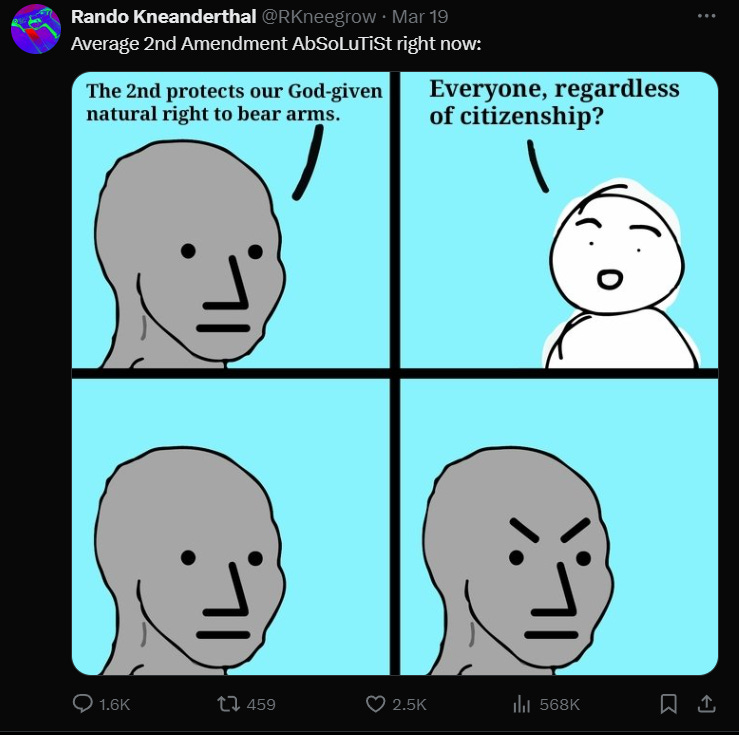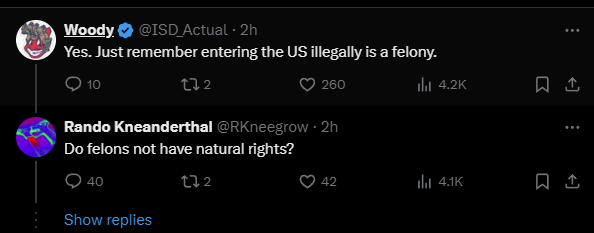Sorry, it’s been so long. I haven’t written any articles because I had nothing to say.
On March 8th of this year, Judge Sharon Johnson Coleman issued a ruling. The Obama-appointed judge sided with an illegal immigrant, Heriberto Carbajal-Flores, and held that illegals are protected under the 2nd Amendment and have the right to bear arms.
Reactions were mostly boilerplate. Progressives either ignored it or used it to dunk on ‘racist’ Republicans. The right correctly saw this as a bad ruling. Libertarians, however, produced takes that surprised me.
This meme did not surprise me because it is dumb (I’m used to that from libertarians), but I was taken aback at how clearly it expressed a wrong idea.
The people I’m referring to describe themselves as 2nd Amendment Absolutists. They argue that self-defense is a fundamental and inalienable right. This right is universal and applies to felons and aliens in addition to citizens of the US. The core of this ideology can be found in this exchange on X.
Let us examine the concept of rights. Broadly speaking, there are two main definitions of political rights: a modern and a traditional sense. What we see in this exchange is that, according to this poster, rights, such as the right to bear arms, cannot be limited in any sense. They are universal and apply to all men, regardless of where they are from or what they may have done. In essence, this is the belief that rights are disconnected from citizenship.
In a traditional context, rights are part of a compact between a specific people and their ruler. Rights are privileges offered in exchange for duties. Citizens are those who have accepted that compact. Non-citizens are bound by no duties and, therefore, cannot claim rights.
Even as late as the American founders, citizenship was something to strive for, always requiring obligations and duties; that’s what granted the “rights.” It was also assumed that citizens had something at stake in society. We have no sense of citizenship anymore, and so we can only speak of rights as empty abstractions.
Consider, as an example, the tradition of arms ownership in Sparta. A citizen soldier is armed and owns a piece of his community. He has a property obligation. He has a stake in society. This is the reason he fights and dies for his community. He has the right to arm himself however he sees fit. Yet this right is coupled with a responsibility to defend the city in which he lives. He is incentivized to do so because he has a stake in the well-being of his canalization.
This tradition is carried on in Republican Rome. Soldiers in the army of the republic were required to own property to be soldiers. They were also expected to equip themselves. This is a similar case where the rights of a citizen were contingent on both a series of duties and having a stake in society.
After the fall of the Empire, we saw this same trend in the medieval world. In Italy and France, the remnants of the Patrician class had wherewithal, willpower, and the skill to use weapons. This is the nucleus of the noble houses of Europe. These are the knights; these are the counts in Europe. These armed men were willing to fight, to assert themselves, and to start building fortifications.
This is the origin of the feudal relationship because the masses do not have weapons and need them very badly. And this is the protection that's offered to them by these new lords, who have training in weapons and military matters and have the will to use these weapons.
When the Americans are talking about weapons ownership at the time of the War for Independence, they hearken back to these Republican traditions in Greece and Rome. They talk about participatory citizenship. At the time of the Philadelphia Constitution, the new American Republic was not going to have a professional army. This was brought up at the Philadelphia Convention, but it was voted down in favor of the well-regulated militia of the Second Amendment. The armed citizen was seen as “the cheap defense of states,” in Edmund Burke's words. This hearkens back to the ‘Spartan Constitution’ and the tradition that springs from it.
Now, as soon as we separate property ownership from citizenship and the franchise, this whole thing changes. It's a very different calculation.
Arms are a shared European tradition. It is connected to political will. It's connected to a stake in society, and when we separate those kinds of connections from ownership and responsibility,
You see this disintegration in the way people talk about guns. Americans have always liked guns. Graded on a curve, America has always been more violent than other Western nations. However, the rise of “self-defense culture" is a product of the post-1968 crime wave. Older people, silent generation or older, are confused by how younger cohorts view weaponry. They look at guns that you have for fun, to go hunting with, or to target shoot. They grew up in a society where you weren't worried about self-defense.
I, for one, would like to live in a civilization where you don't need to worry about a mob clubbing your head in.
The idea of an armed citizen is a product of European tradition. It makes sense for Europeans. Within that context, people have a shared understanding of rights and responsibilities. If you change that consensus, if you let people in who have a different understanding, who have a different sort of mode of being, that common understanding breaks apart.
To claim rights, one must accept certain duties. These duties are grounded in a sense of ownership. Libertarians view rights as universal and non-contingent. These men are the henchmen of the state. Their conception of rights is completely disconnected from the tradition of citizenship and property ownership. They are allowed to get what they want when it disintegrates society in a way that benefits the Regime. They think they’re winning. In other words, they are retarded.





The Tradition of the Citizen-soldier was a cherished tradition of the old republic but sadly we've decayed so much people call this tradition fascist. The channel Pilgrims Pass talks about this tradition in some of his videos. Peace
Excellent essay. What's fascinating about this "debate," as if handing a gun out to anyone who crosses the border is somehow a good thing, is how even JFK understood the linkage between the right to bear arms and the citizenry.
"Today we need a nation of minute men; citizens who are not only prepared to take up arms, but citizens who regard the preservation of freedom as a basic purpose of their daily life"
Now that we have a nation in the abstract, our rights are becoming more abstract as well.